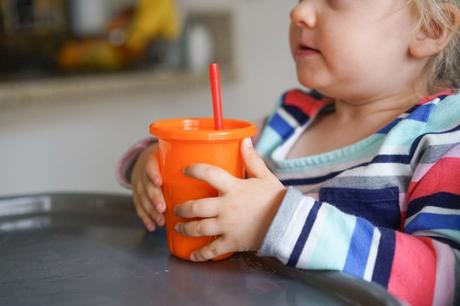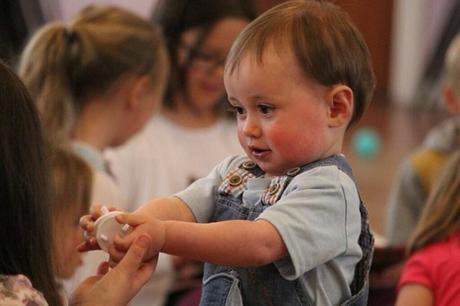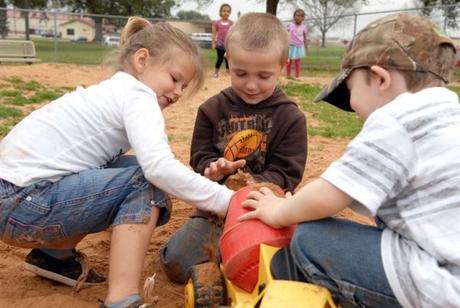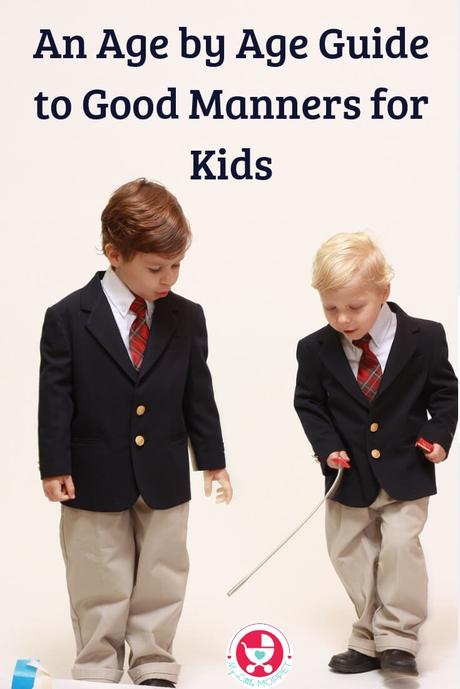June 22, 2019 Leave a Comment
Manners are sorely lacking in today’s world. Here’s an age wise guide to Guide to Good Manners for Kids so you can raise them to be kind and helpful adults.
“Manners are a sensitive awareness of the feelings of others. If you have that awareness, you have good manners, no matter what fork you use.”
The quote above is by Emily Post, author of multiple books on etiquette, including ‘The Guide To Good Manners For Kids‘. Even though Ms. Post lived in a time when people openly spat and blew their noses in public, which is probably what drove her to write in the first place! But she was quite insightful and knew that good manners is much more than that.
I know of many people who sneer at the words ‘manners’ and ‘etiquette’. They think it’s a western concept that’s not suited to our culture, or that it’s just unnecessary fussing about the right kinds of spoons and forks to eat with. However, while cultural specifics may exist, basic good manners are the same across the world, and are an inherent part of all our lives.

Why is it important to teach good manners?
This is a very important question, since knowing the ‘why’ will make our task as parents a lot easier. Have you ever witnessed a debate on any public forum – a TV show or social media or on a stage? How did everyone treat each other? Did they respectfully put across their point, respect the other person’s opinion and wait till they finished speaking? Unless you’ve been living under a rock, you know that this is the opposite of what’s actually happening!
And that’s where manners come into the picture. Yes, manners do show others that we’re from a civilized or ‘cultured’ family, and kids’ manners reflect our parenting skills. But it’s more important than that. Manners are all about being considerate about others – their feelings and their convenience. Well mannered people make the world a much better place to live in. Besides, a person with good manners is generally respected, even by people who don’t like them. They find it easier to develop and maintain good relationships as well as to succeed at school and at work.
It may be too late to change inculcate good manners in the people who are screaming at each other on TV, but not for our kids! Young children’s brains are like sponges – they absorb a lot more than we think, and habits they learn during these early years will last through life. That’s why they say that your little one is never too old to say Please and Thank you!
I know this can be confusing, especially when it comes to toddlers or very young kids, so we’ve put together an age by age guide to good manners for kids. Try to practice these at home and slowly but surely you can see your child blossoming into a polite, kind, compassionate person, who is a delight to be around!

An Age by Age Guide to Good Manners for Kids
Note: Please remember that the age guidelines given below are generic and that every child is different. You can adjust these according to your child’s temperament and level of comfort – just remember to take it step by step!
1 – 2 Years

1. Say Hello and Goodbye. For most toddlers among the first words they learn are ‘Hello’ and ‘Bye’. Encourage them to say these on the right occasions, like when greeting people or when they or someone else is leaving.
2. Eat at the table. If your baby has been used to eating from the high chair, this should be fairly easy. At this point you can remove the high chair tray and help them sit at the table directly. Make sure all their meals are at this one place.
3. Say Please and Thank You. As your baby’s vocabulary expands, introduce words like please and thank you. Every time you say thank you when they hand you something, they’ll slowly create an association with the word and begin to use it themselves.
3 – 4 Years

1. Don’t make fun of the food. This age is the one of picky eating and general choosiness when it comes to food, so teach your kids to be silent even if they don’t like it. Saying ‘yucky’ about the food is not okay, and if they won’t eat it, they can just leave it there without passing comments.
2. Chew with the mouth closed. This is a basic skill that’s quite difficult to change later, so the earlier you start the better! Let them take in small mouthfuls so they can chew comfortably with their mouth closed.
3. Don’t talk with the mouth full. If they chew with their mouth closed, this becomes easy. If they talk while eating, tell them you can’t understand anything and they should speak once they’ve swallowed their food. If they continue, ignore them till they follow.
4. Say Sorry. By this age, kids start getting an understanding of right and wrong, and they have an idea when they’ve hurt someone. It’s important that you don’t force a mechanical ‘I’m sorry’ as this serves no purpose. Help them understand that just saying ‘sorry’ can ease the situation and make the other person feel better.
5. Always greet someone when meeting them. Teach kids to greet others in whatever way is practiced in your household. It can be “Hello”, “Good morning” or “Namaste”. Any of these will do for now – as they grow older they can return greetings in the language they are greeted. They can also shake hands wherever appropriate.
6. Keep your hands to yourself. It’s natural for kids of this age to want to hit or scratch when they get angry, but they are also old enough to understand that you have a no-tolerance policy for violence. Tell kids that they are under no circumstances to hurt someone else in any way, and they should go to an adult in case of any problem.
5-6 Years

1. Don’t interrupt grown ups. Kids this age have endless questions and things to talk about, and while you should definitely talk to your child, it’s important for them to realize that they can’t just butt into another person’s conversation. Ask them to wait, and if it’s an urgent matter, they can pipe in with an ‘Excuse Me’.
2. Respond when spoken to. Children should realize that not answering a question or ignoring someone is rude, and that they wouldn’t like it if someone did it to them. If they’re not interested in continuing the conversation, they shouldn’t be forced, but as long as they’re being spoken to, they should listen.
3. Ask for things at the dinner table. This is a good age for kids to learn patience, and that includes not leaning over across other people at the dining table. Let them ask someone for what they want instead of grabbing it directly.
4. Do not shout when speaking. Many kids this age may speak loudly out of over excitement and not with the purpose of being rude. However, we need to help them understand that the listener will find it rude, since shouting is done when people are angry. Practice speaking in a soft tone so they get used to it.
5. Never use abusive language. Kids learn new words from various sources, including friends and neighbors. Some of these may be unsavory, and hearing your child use such language can be shocking. Rather than reacting sharply, tell them that such words only create trouble and hurt people’s feelings – they don’t do any good. Remember that overreacting is likely to make them use it more, just to shock you further.
6. Don’t comment on another person’s appearance. Children will notice when a person is different from the people around him, and he may innocently draw attention to it. Don’t wait for such an incident to happen – talk to them beforehand about how people may be different from the outside, but are the same on the inside, and everyone has feelings that can get hurt. You can try reading some books on diversity to help them understand the concept better.
7. Don’t Point or Stare at People. Similar to the point above, young kids will point at a person and loudly say, “Look at that man’s funny hair!” Some people may laugh it off, but not everyone! Teach kids that if they want to show you something they should do so in a gentle way, and definitely not by pointing at others.
8. Stand up when an elder enters the room. Manners like these are practically non-existent these days! While we don’t have to agree with everything our elders say, we still need to be respectful, and one way of doing this is by standing up. Kids also need to avoid putting up their feet in front of elder people – it’s a small thing, but it makes a difference.
9. Knock before entering a room. This is something kids need to learn as early as they can. It might be difficult for them to understand the concept of privacy at this age, so a blanket instruction to knock before entering is easier for them to follow.
10. Ask permission before taking something. Even if your child is in her own home, teach her that she needs to ask before taking something that’s not hers, like Mom’s purse or Dad’s phone. If there are siblings, their belongings should also be respected.
11. Wait for your turn. This is something that Indians are sorely lacking in! It’s common to see people rushing everywhere, so it can be a little difficult to implement – but it’s worth the effort. Whether it’s to speak or while standing in a queue, tell kids that they shouldn’t push ahead of someone else, but should wait for their turn.
12. Be careful with bodily functions. Kids of this age are most likely potty trained, so they are old enough to be able to control their bodies. They should be taught to cover the mouth when coughing or sneezing, using the inside of their elbow. Picking the nose in public is also a no-no, as is farting loudly. In case of an accidental gas leak, teach them to say ‘Excuse me’.
7 – 8 Years

1. Accept gifts graciously. Presents are very exciting for kids, especially if it’s an occasion like their birthday, or Diwali or Christmas, when their expectations are sky high. Teach them to value the gift for what it is – a thoughtful gesture – rather than the size or monetary value. Even if it’s something they don’t want or like, they should accept it with a smile and say thank you.
2. Return things that are borrowed. Once they’ve learnt to ask permission before taking something, teach them that it’s just as important to return it – intact – and even if the other person hasn’t asked for it yet. This will also teach them to take care of others belongings as well as theirs.
3. Serve guests. Kids this age are old enough to serve guests in a simple manner. They can greet them, ask them to sit and offer them a simple drink or at least a glass of water. Let them try out different ways to ensure that their guests are comfortable. While you shouldn’t force a child to speak to guests, they can still be polite and excuse themselves if they need to leave.
4. Be a good guest. Being a good guest is just as important as being a good host! Practice being a good guest right at home, since you won’t have any control once your child is at someone else’s house. All the rules above apply – don’t be fussy about food, greet everyone, ask before taking anything and knock before entering. Tell kids that adults’ bedrooms are off-limits and they shouldn’t go there even if other kids ask them too.
5. Be polite to people who serve. These are small gestures that can make a huge difference in someone’s life, while making your child a much more compassionate person. Whether its the cashier at the supermarket, the school bus driver, the janitor or the waiter at the restaurant, let them smile and say all the magic words wherever appropriate. Make it a point to thank all of them whenever possible.
6. Don’t join bullies. Considering the kind of world we live in, bullies are everywhere, and of every age. Most bullies pick on differences in others, either appearance, food habits, interests, language or anything else. Tell kids that it is not okay to make fun of other people, no matter how different they may seem from us.
9 – 10 Years

1. Don’t tell the world your negative opinions. With social media being what it is, every Tom Dick and Harry has an opinion that may be based on anything but fact, and which makes its way to the internet. Teach kids that it’s fine to have an opinion and everyone is entitled to one. But let them know that what we see is always only one part of the story and we cannot judge a person or a situation based on it.
2. Pay compliments. Younger kids can be taught to not say bad things, but older kids can take it a step further by saying something nice. If they’re a guest somewhere, they can say something good about their home or their food. They can say it to their friend, friend’s parents or whoever is directly involved, like the cook who cooked that lovely dish.
3. Listen when someone is talking. Fiddling on the phone when someone is talking is extremely rude, and kids need to learn this lesson as early as possible. Teach them about active listening, and that they need to pay attention to the speaker. This also applies when having a conversation on the phone.
4. Hold the door open for the person coming after you. Kids this age are physically capable of doing this, so it’s something that must be insisted upon. Ask them how they would feel to have a door bang in their face as they’re trying to enter it and they’ll understand the reason behind this rule!
5. Offer help where possible. By this age, kids can be expected to be more proactive in helping others. Whether it’s helping a neighbor with her groceries, or Grandma with her new phone, they can help in whatever little way they can – let them know that no kindness is too small.
6. Respect a person’s privacy. Explain the concept of privacy to your child, so they understand it both in terms of their own privacy as well as others. Tell them that it’s rude to ask personal questions like what a person’s salary is. Respecting privacy also involves not peeking at someone’s phone or eavesdropping on others’ conversations.
7. Clean up after use. This applies to everything from their toys to the toilet. Whatever they use, they shouldn’t just leave it and walk away. Even if they’ve used a cup to drink water, it needs to go back to the kitchen sink. Dirty clothes should go in the laundry and the trash remaining after a craft project needs to be picked up.
8. Respect public property. It’s really sad to see the way some people treat public property, not realizing that they’re owners of it too. Instill this idea into kids’ brains at a young age so they learn to care for their streets, buses and all places like it were their own home. By no means is willful destruction of public property to be tolerated.
Tips to instill good manners in Kids

Reading all these rules you may be wondering “No way is my child going to do all that!” Well, it’s natural to feel that way but the truth is that our kids are much more capable of goodness than we give them credit. You can easily achieve this as long as you follow a few tips.
1. Practice what you preach. None of this will have any effect if you don’t practice these yourself.
2. Don’t try to dump it all at once. Focus on one or two behaviors and let kids practice it.
3. Don’t have double standards. If your kids are sloppy at home, don’t expect them to suddenly become suave when you step outside.
4. Use every opportunity you can to practice with your kids.
5. Make it fun. No one likes to be preached to, so turn it into a fun game. Humor makes everything better.
6. Notice when your child does something good and applaud her for it.
7. If you notice her doing something wrong, correct it right away. Keeping it for later will lose its effect.
8. If you notice consistent bad behavior, look for the source. Maybe it’s bad company or bad role models on a TV show.
9. Check out some age appropriate books on good manners.
And most importantly, have loads of patience! Your child is not going to turn into a well mannered young lady or gentleman overnight, and you shouldn’t expect that. What you should expect, is to repeat instructions over and over again, answer some difficult questions and see them go off track occasionally. But as long as you’re there to guide them back on the right path, they’ll follow your example and grow up to be wonderful human beings you will be proud of.

Organic · FSSAI Certified · NABL Lab certified Buy Sprouted Sathumaavu Health Mix powder for Babies / Homemade Cerelac Dry Fruits Powder for Babies/Toddlers Pancake Mixes for Toddlers TweetPinShareWhatsAppEmail
Filed Under: Parenting Tagged With: habits, manners, parenting, parenting hacks, parenting tips
